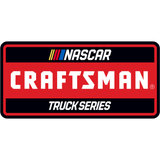
Robert Yates posthumously inducted into NASCAR Hall of Fame
CHARLOTTE, N.C. (AP) Robert Yates lived long enough to hear his name announced as a NASCAR Hall of Famer.
Although he lost his battle with liver cancer five months after he was voted into the Hall, Yates was able to write his own acceptance speech for Friday night's ceremony. It was read by Dale Jarrett, a Hall of Famer who won the 1999 championship driving for Yates.
''When I started in racing, this was not the goal,'' Jarrett read from Yates' speech. ''All I wanted to do throughout my career was win races. I would always say, I don't race for the money, I race to win. For me, that's what it's always been about, but to be part of this year's induction class is a true honor.''
Yates was a championship-winning car owner and engine builder who learned from Waddell Wilson and Junior Johnson. He built the powerplants for Bobby Allison's 1983 Cup championship team, and the engines used when Richard Petty drove to his 199th and 200th victories - his last - of Petty's career.
As a car owner, Yates drivers won 57 races that included three Daytona 500s. A year ago, as he was in his losing fight with cancer, Kurt Busch drove a Yates-powered car to the Daytona 500 title.
Also inducted Friday night were pioneering crew chief Ray Evernham, Red Byron, NASCAR's first champion, four-time Truck Series champion Ron Hornaday Jr. and Ken Squier, the first broadcaster to make the Hall.
Evernham led Jeff Gordon to three of his four championships and changed the sport in his approach to preparing race cars. He pushed limits through innovation, engineering and formed Gordon's ''Rainbow Warriors'' pit crew that was the best in NASCAR.
''It was 1995, we win the championship in Atlanta, it wasn't the best of days, we didn't perform very well,'' Gordon recalled. ''But we did win the championship. And to tell you what kind of person Ray Evernham was, I think he enjoyed that championship for maybe a split-second before he started thinking about what was wrong with that race car, and he showed up at the shop the next morning, the day after we won that championship, to figure out what was wrong with that race car. And he found it.''
Evernham eventually transitioned into car ownership and spearheaded Dodge Motorsports' return to NASCAR in 2001. Hall of Famer Bill Elliott earned Evernham Motorsports its inaugural victory that season, and Evernham collected 15 wins as a team owner.
Evernham was inducted by Gordon and his son, Ray J.
''A young boy playing with toy cars in a stone driveway at the Jersey Shore could only dream of a moment like this,'' said Evernham, who thanked mentor and former boss Rick Hendrick by telling the Hall of Fame car owner, ''you saw more in me than I saw in myself. You believed in me. I was a young, unorthodox crew chief.''
Hornaday's 51 victories are a Truck Series record, as well as his championships. He was introduced Friday night by Kevin Harvick, one of the many drivers who Hornaday helped make it in NASCAR.
Hornaday frequently allowed young racers to live on his living room couch when they relocated to North Carolina. Among them are Harvick and Jimmie Johnson, who have eight Cup titles between them. Harvick eventually repaid the favor by fielding a Truck Series team that gave Hornaday two of his titles.
He revealed he'd spent two sleepless nights leading into Friday trying to prepare a speech.
''Sitting up here trying to think what you're going to say to anybody, and it's the toughest thing you'd ever say,'' he said. ''Everybody would just say `Just be yourself, it's easy.' It's the frigging Hall of Fame, guys, it's the toughest thing you've ever done.''
Byron was NASCAR's first crowned champion in the Modified Series and in 1948 the Strictly Stock Series, which is now called the Monster Energy NASCAR Cup Series. His induction was presented by current NASCAR champion Martin Truex Jr.
Byron served in the United States Army Air Corps in the Pacific during World War II. He suffered a severe injury to his left leg while flying in a combat mission and later had to wear a specially created steel leg brace while racing.
''He set the foundation for the rare few who capture the most coveted prize in motorsports, a championship at NASCAR's highest level,'' Truex said. ''This driver had admirable talent but possessed even greater toughness and courage. He will always be the first, he will always be a pioneer, and now he'll always be a NASCAR Hall of Famer.''
Squier worked NASCAR's flag-to-flag network television debut in the 1979 Daytona 500. He was introduced by Dale Earnhardt Jr., who is transitioning from racing into broadcasting, and inducted by Vermont Gov. Phil Scott.
Squier is the co-founder of the Motor Racing Network and a longtime voice of NASCAR. He had co-founded MRN in 1969 before moving to television. He's also credited with helping develop the sport's first ''in-car camera'' that is still used in telecasts today.
''The heroes in this room who earned their way through tenacity, courage, and their ability to accomplish something they believe worthwhile, vital, and now they've added a storyteller,'' Squier said. ''And believe me, I can tell some stories. Most of them aren't true, so don't be concerned.''
---
More AP Auto Racing: https://racing.ap.org/
